【2015中考复习方案】(译林牛津版·全国)2015届九年级英语复习课件(自学反馈+重点突破):第3课时 Units 1—4 [七年级下册](共39张PPT)
文档属性
| 名称 | 【2015中考复习方案】(译林牛津版·全国)2015届九年级英语复习课件(自学反馈+重点突破):第3课时 Units 1—4 [七年级下册](共39张PPT) | 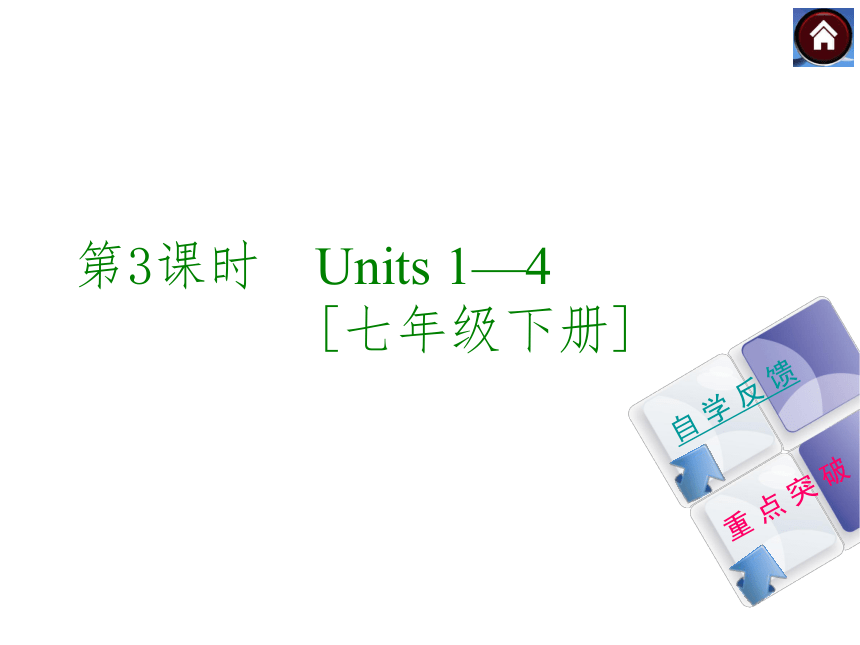 | |
| 格式 | zip | ||
| 文件大小 | 270.5KB | ||
| 资源类型 | 教案 | ||
| 版本资源 | 牛津译林版 | ||
| 科目 | 英语 | ||
| 更新时间 | 2015-01-17 19:53:46 | ||
图片预览

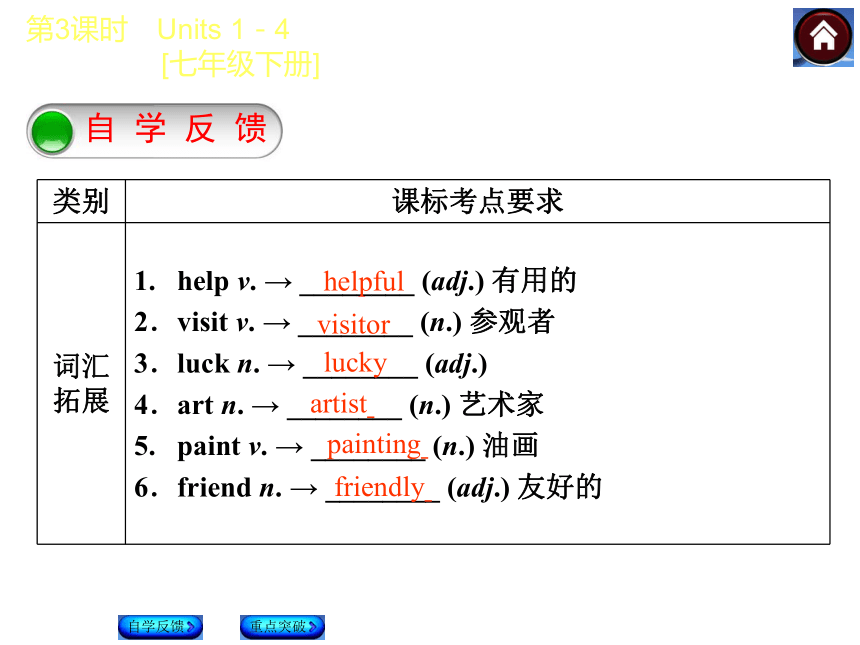
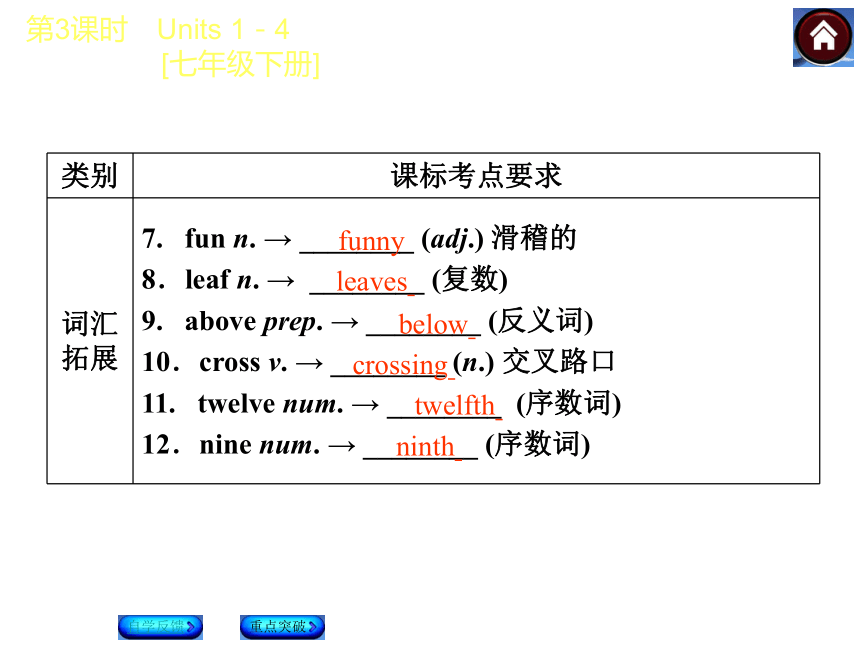
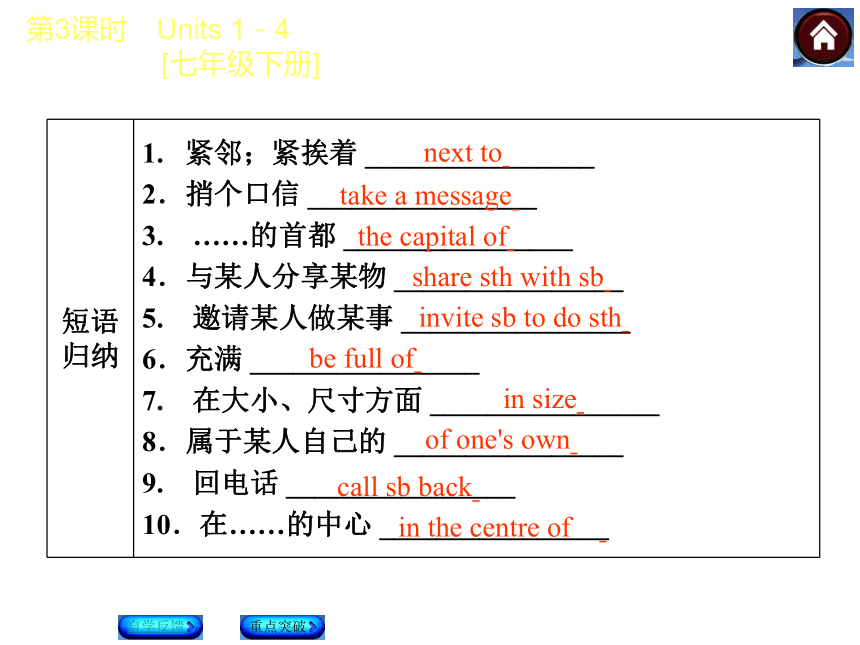
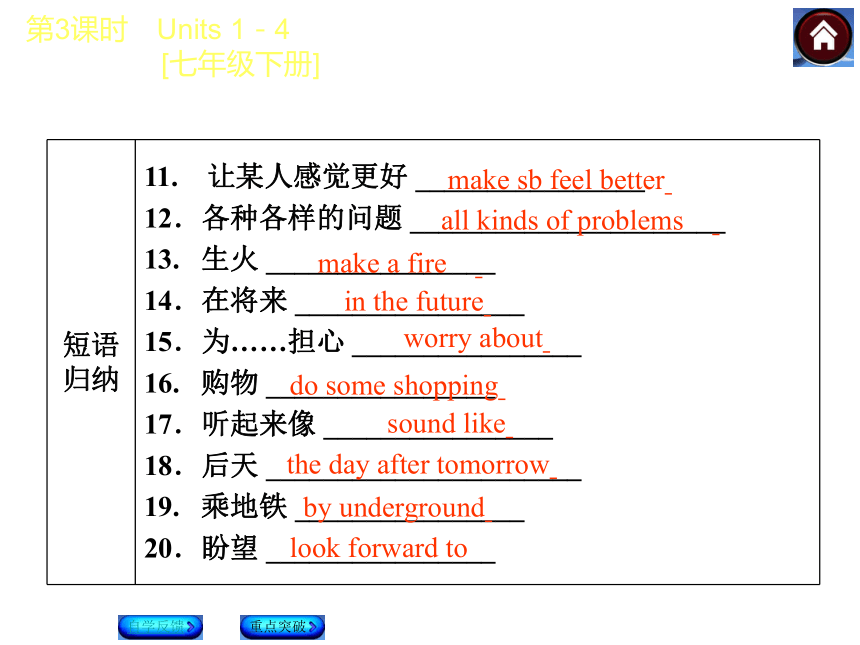
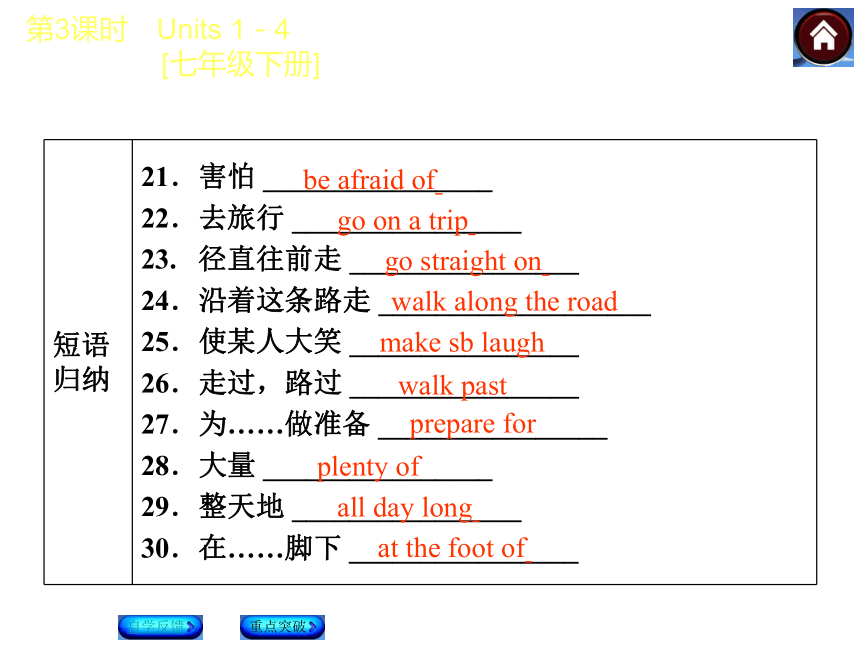
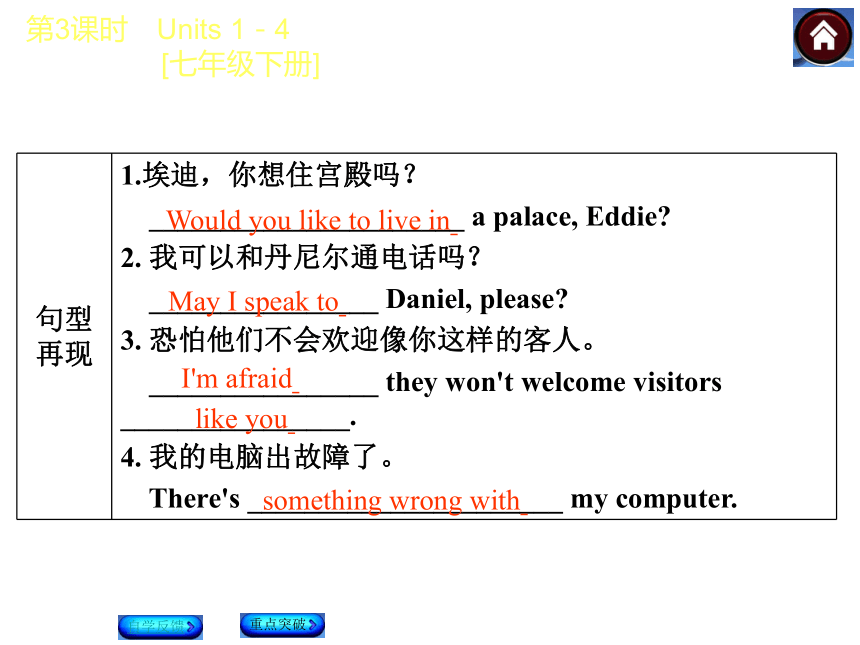
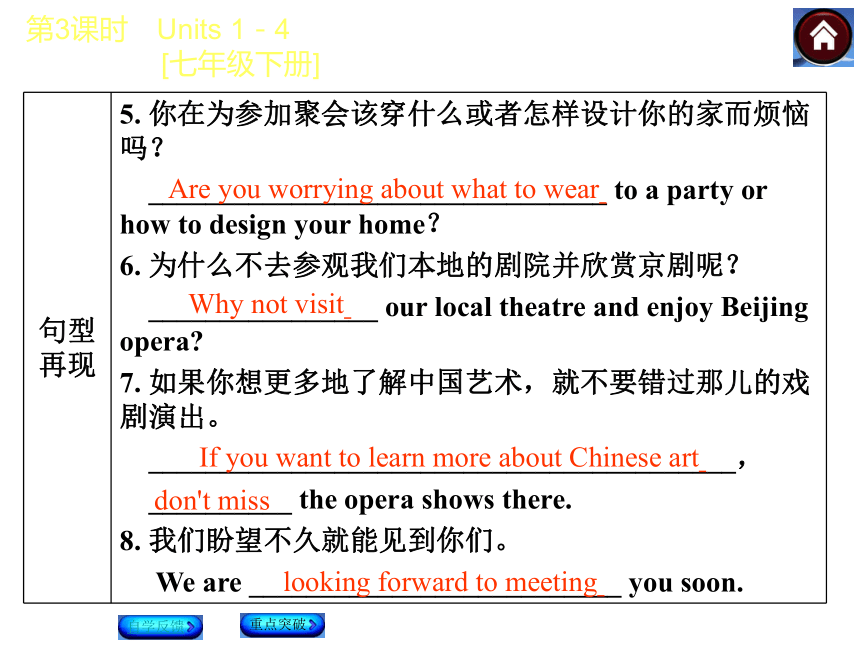
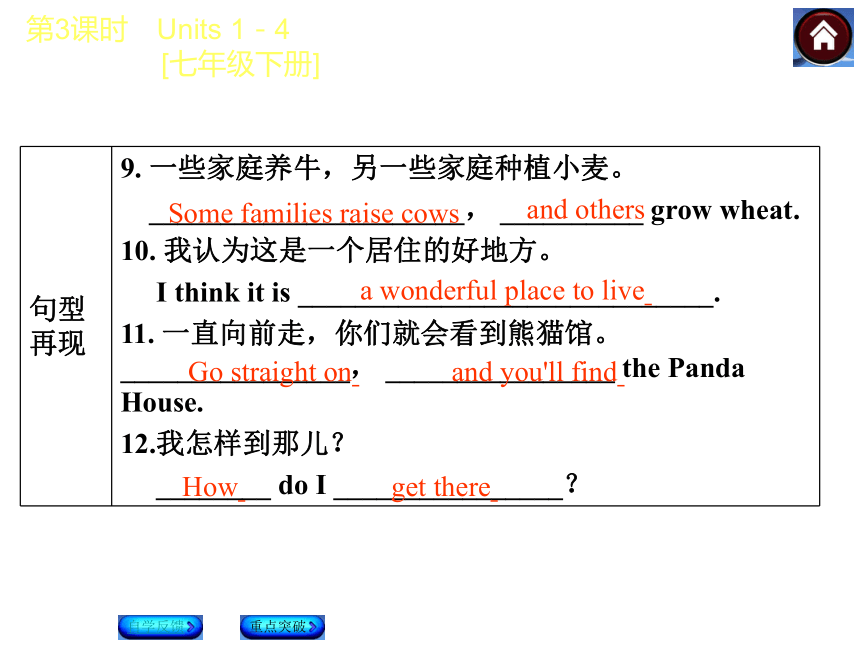
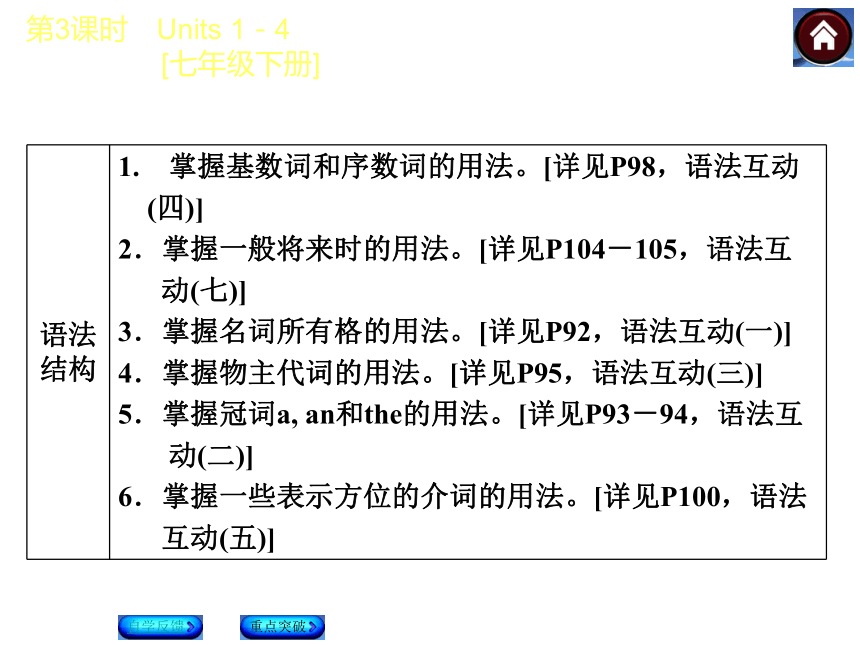
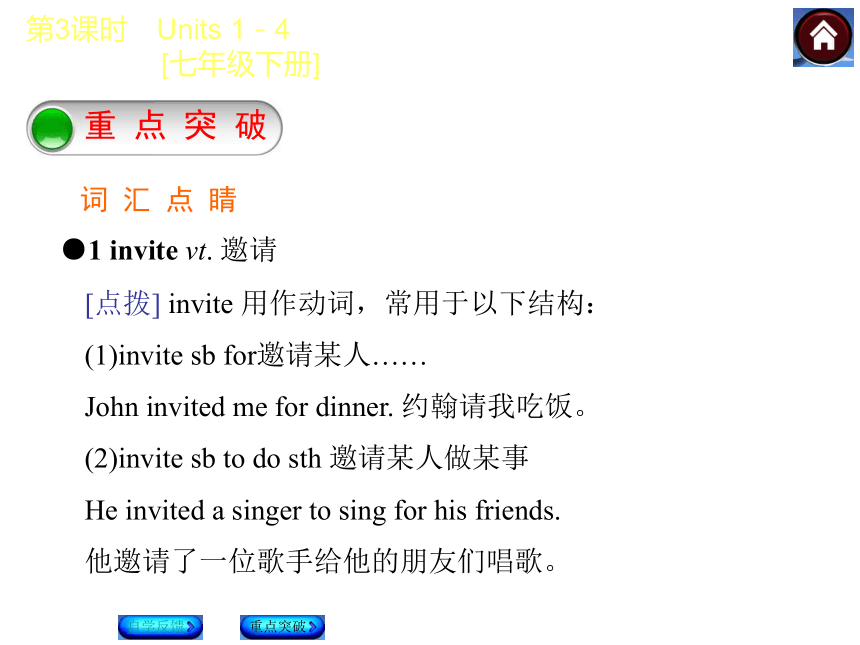
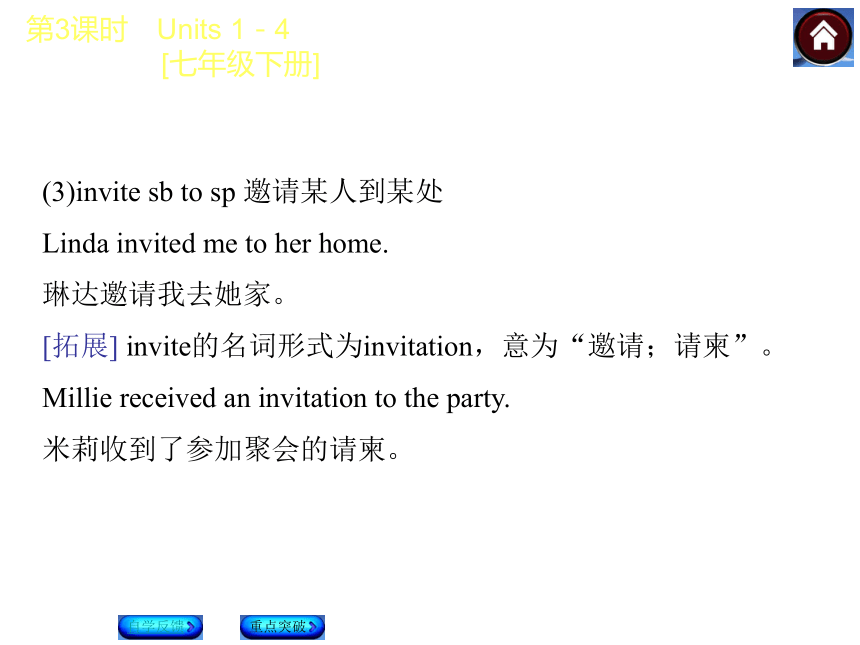
文档简介
课件39张PPT。第3课时 Units 1—4
[七年级下册]自 学 反 馈重 点 突 破第3课时 Units 1-4
[七年级下册]自 学 反 馈 lucky visitor artist painting helpful 自学反馈重点突破friendly funny leaves crossing below ninth twelfth 第3课时 Units 1-4
[七年级下册]自学反馈重点突破第3课时 Units 1-4
[七年级下册]重点突破next to take a message the capital of share sth with sb invite sb to do sth in size of one's own call sb back in the centre of be full of 自学反馈make sb feel better all kinds of problems make a fire in the future worry about 第3课时 Units 1-4
[七年级下册]重点突破do some shopping sound like the day after tomorrow by underground look forward to 自学反馈be afraid of go on a trip go straight on walk along the road make sb laugh 第3课时 Units 1-4
[七年级下册]重点突破walk past prepare for plenty of all day long at the foot of 自学反馈Would you like to live in May I speak to I'm afraid like you something wrong with 重点突破第3课时 Units 1-4
[七年级下册]自学反馈Are you worrying about what to wear Why not visit don't misslooking forward to meeting If you want to learn more about Chinese art 重点突破第3课时 Units 1-4
[七年级下册]自学反馈Some families raise cows and others a wonderful place to live 重点突破第3课时 Units 1-4
[七年级下册]Go straight on and you'll find How get there 自学反馈重点突破第3课时 Units 1-4
[七年级下册]自学反馈词 汇 点 睛●1 invite vt. 邀请重 点 突 破重点突破第3课时 Units 1-4
[七年级下册][点拨] invite 用作动词,常用于以下结构:
(1)invite sb for邀请某人……
John invited me for dinner. 约翰请我吃饭。
(2)invite sb to do sth 邀请某人做某事
He invited a singer to sing for his friends.
他邀请了一位歌手给他的朋友们唱歌。自学反馈
(3)invite sb to sp 邀请某人到某处
Linda invited me to her home.
琳达邀请我去她家。
[拓展] invite的名词形式为invitation,意为“邀请;请柬”。
Millie received an invitation to the party.
米莉收到了参加聚会的请柬。 重点突破第3课时 Units 1-4
[七年级下册]自学反馈●2 broken adj. 损坏了的;破碎的
[点拨] broken 用作形容词,在句中作表语或定语。
The TV is broken. I will have it repaired this afternoon. 这台电视机坏了。今天下午我将让人修理一下它。
[拓展] broken的动词形式为break,意为“打破;打碎”。
Take care not to break the cup.
小心别把茶杯打碎了。
She is eager to break the record.
她渴望打破那项记录。重点突破第3课时 Units 1-4
[七年级下册]自学反馈
[搭配] 与break相关的短语:
break down (机器)坏了;(计划、谈判) 失败;(谈话、通讯) 中断
break into 破门而入;打断(谈话);占用
break off 突然停止;中断(谈判);断绝(关系)
break out (战争、瘟疫、火灾等)爆发
break up 散会;(学期)结束;驱散(集会);(精神上)垮掉 重点突破第3课时 Units 1-4
[七年级下册]自学反馈●3 raise vt. 饲养
Most students in our school raise pets.
我们学校的大多数学生都饲养宠物。
[拓展] (1)raise 还可译为“举起;升起;提起;抬起(某物)”。常用搭配:raise one's hand 举手
He raised his eyes from his work. 他停下工作举目观看。
(2)raise 还有“募集”之意。常用搭配:raise money for… 为……募集资金
We'll hold a charity show to raise money for poor children.
我们将举行一个慈善义演来为贫困儿童募集资金。重点突破第3课时 Units 1-4
[七年级下册]自学反馈●4 of one's own 属于某人自己的
Millie has a new bike of her own.
米莉有一辆自己的新自行车。
[拓展] on one's own 意为“单独;独自”,相当于alone/by oneself。
You'd better finish the homework on your own.
你最好独自完成家庭作业。重点突破第3课时 Units 1-4
[七年级下册]自学反馈●1 family, house和home
(1)family意为“家人;家庭成员”。family作整体概念的“家庭”讲时,看作单数,作主语时,谓语动词用单数形式; 作“家庭成员”讲时,看作复数,作主语时,谓语动词用复数形式。
The whole family are watching TV.
全家人都在看电视。巧辨异同重点突破第3课时 Units 1-4
[七年级下册]自学反馈
(2)house意为“房屋”,侧重居住的建筑物。
There is a river behind the house.
在那座房子的后面有一条河。
(3)home 意为“家”,侧重个人出生、被抚养长大的环境或居住地,含有“家乡;故乡”的意思。它具有house 所没有的感彩(如团聚、思念等)。
Her home is far away. 她的家很远。重点突破第3课时 Units 1-4
[七年级下册]自学反馈重点突破第3课时 Units 1-4
[七年级下册]●2 elder和older
(1)elder表示“年纪较长的”,仅用于同一家庭里的成员的比较;older则不限于此。
My younger son is five and my elder son is nine.
我的小儿子5岁,大儿子9岁。
Tom is two years older than me.
汤姆比我年长两岁。自学反馈重点突破第3课时 Units 1-4
[七年级下册](2)elder在句中只作定语,不作表语;older两者皆可。
My elder sister does her homework all by herself.
我姐姐独自做作业。
I think his mother is older.
我认为他的母亲年龄比较大。
(3)elder只能用来修饰人;older既可修饰人,也可修饰物。
This dog is older than any other dog here.
这条狗比这里其他的任何狗都老。自学反馈
●3 ill和sick
ill 和sick都有“生病的;有病的”之意,但在用法上有所不同。
(1)ill 表示“生病的;有病的”,在句中一般用作表语,不作定语;而sick 在句中既可以作表语又可以作定语,如:“病人”可以说成a sick man 或the sick, 但不能说成an ill man 或the ill。
She is ill/sick in bed. 她卧病在床。
She is looking after her sick father.
她在照顾她生病的父亲。 重点突破第3课时 Units 1-4
[七年级下册]自学反馈
(2)sick 还可以表示“恶心的;厌倦的”,ill无此义。
The smell makes me sick. 这气味使我感到恶心。
(3)ill 作定语修饰名词时,还可译为“坏的;邪恶的”。
He is an ill man. 他是一个邪恶的人。 重点突破第3课时 Units 1-4
[七年级下册]自学反馈
●4 hear sb do sth与hear sb doing sth
(1)hear sb do sth意为“听到某人做某事”,指动作已经结束或动作经常发生。
I often hear Millie sing in the next room.
我经常听到米莉在隔壁房间里唱歌。
(2)hear sb doing sth 意为“听到某人正在做某事”,指动作正在进行。
When I passed the classroom, I heard a girl singing in it.
当我经过教室的时候,我听到一个女孩儿正在里面唱歌。
[拓展] 在see, feel, watch, notice 等表示感知的动词后,既可接 v.-ing 构成复合宾语,也可用不带to 的动词不定式构成复合宾语。这两种结构的区别与hear的用法类似。重点突破第3课时 Units 1-4
[七年级下册]自学反馈
●5 remember to do sth 与remember doing sth
(1)remember to do sth 意为“记得要做某事”,指这个动作在说话时还未做。
Remember to close the door, please.
请记着把门关上。
(2)remember doing sth 意为“记得做过某事”,指说话时动作已完成。
I remember closing the door. 我记得把门关上了。
[拓展] forget 意为“忘记”,与remember的用法类似。重点突破第3课时 Units 1-4
[七年级下册]自学反馈
●6 cross, across, crossing和through
(1)cross 为动词,意为“穿过,横过”,指从一个平面通过,常用于过桥、河、路、街道等。
Look left and right before you cross the street.
在你过马路之前要左右看看。
(2)across 为介词,意为“横跨;横穿;穿越”,常与动词walk, run, go, jump等连用,与cross基本同义。
Go across the road, and you will find the post office on your left.
穿过这条公路,你会发现邮局就在你的左边。重点突破第3课时 Units 1-4
[七年级下册]自学反馈
(3)crossing 为名词,意为“十字路口;交叉处”。
Turn left at the second crossing.
在第二个十字路口处向左转。
(4)through 为介词,意为“穿过;通过”,指从物体的内部穿过。
He walked through the forest alone.
他独自走过了那片森林。重点突破第3课时 Units 1-4
[七年级下册]自学反馈●1 Would you like to live in a palace, Eddie? 埃迪,你想住宫殿吗?
[点拨] would like常用于委婉地提出请求、建议或某种看法。根据需要可用不同的表达方式:would like sth 想要某物;would like to do sth 想要做某事; would like sb to do sth 想要某人做某事句 型 透 视重点突破第3课时 Units 1-4
[七年级下册]自学反馈—Would you like some coffee?
—Yes, please./No, thanks.
“您想喝一些咖啡吗?” “好的。/不用了,谢谢。”
—Would you like to go with me?
—Yes, I'd like/love to.
“你愿意和我一起去吗?” “是的,我愿意。”重点突破第3课时 Units 1-4
[七年级下册]自学反馈●2 —There are twenty restaurants in town. Which is your favourite?
—The biggest one in Fifth Street!
“镇上有二十家餐馆,你最喜欢哪一家?”
“第五大街上最大的那家!”
[辨析] one与it
(1)one 表示泛指,指代上文出现过的同类事物。
I can't find my hat. I think I must buy a new one.
我找不到我的帽子了。我想我该去买一顶新的。
(2)it 表示特指,指代上文出现过的同一事物。
I can't find my hat. I don't know where I put it.
我找不到我的帽子了。我不知道我把它放在哪儿了。重点突破第3课时 Units 1-4
[七年级下册]自学反馈●3 There's something wrong with my computer. 我的电脑出故障了。
[点拨] 句型“There is something wrong with…”意为“……出故障/有毛病”,相当于“Something is wrong with…”或“…doesn't work.”或“…is broken.”
[拓展] 句型“There is nothing wrong with…”意为“……没有毛病”。重点突破第3课时 Units 1-4
[七年级下册]自学反馈●4 Why not visit our local theatre and enjoy Beijing opera? 为什么不去参观我们本地的剧院并欣赏京剧呢?
[点拨] 句型“Why not+动词原形?”意为“为什么不……呢?”。该句型是用来提出建议的交际用语,相当于“Why don't you+动词原形?”。重点突破第3课时 Units 1-4
[七年级下册]自学反馈[拓展] 英语中其他表示提建议的句型:
(1)What/How about doing sth? 做某事怎么样?
(2)Let's do sth! 让我们做某事吧!
(3)Shall we do sth? 我们做某事好吗?
(4)You had better (not) do sth 你最好(不)做某事
(5)Would you like (to do)sth? 你想要某物/做某事吗?
(6)Would you please do sth? 请你做某事,好吗?重点突破第3课时 Units 1-4
[七年级下册]自学反馈
●5 Go straight on, and you'll find the Panda House. 一直向前走,你们就会看到熊猫馆。
[点拨] 这是“祈使句+and+陈述句”句型。and连接的两个句子是一种顺承关系,祈使句表示条件或假设;陈述句表示结果或推论。
Study hard, and you'll make great progress.
努力学习,你将会取得很大进步。重点突破第3课时 Units 1-4
[七年级下册]自学反馈
[拓展] “祈使句+and/or+陈述句”结构可以和if引导的条件状语从句互相转换。
Work hard and you will succeed.
=If you work hard, you will succeed.
努力学习,你就会成功的。
Work hard, or you will fail the exam.
=If you don't work hard, you'll fail the exam.
努力学习,否则你将会考试不及格。重点突破第3课时 Units 1-4
[七年级下册]自学反馈
●6 How do I get there? 我怎样到那儿?
[点拨] 此句为问路的交际用语。表达问路的常用句型还有:
(1)Excuse me, where is…?
(2)Can/Could you tell me the way to…?
(3)Which is the way to…?
(4)Can/Could you tell me how to get to…?
(5)Can/Could you tell me how I can get to…?重点突破第3课时 Units 1-4
[七年级下册]自学反馈
[拓展] 常用的指路的句型:
(1)Go along the street until you come to the traffic lights.
(2)Turn right/left at the second crossing. (Take the second turning on the right/left.)
(3)Walk/Go along/down the road.
(4)Go straight on, and you can see…on your left/right.重点突破第3课时 Units 1-4
[七年级下册]自学反馈Ⅰ.用括号内所给词的适当形式填空
Would you like __________ (go) on a picnic this weekend,
Linda?
2. She is such a ________ (help) girl that we all like her.
3. Beijing is a wonderful place ________ (live).
4. My pen is __________ (break). Could you lend me yours?
5. Remember ________ (return) the book to the library after reading it.to go helpful 重点突破第3课时 Units 1-4
[七年级下册]to live broken to return 自学反馈重点突破第3课时 Units 1-4
[七年级下册]Ⅱ.单项选择
( )1. —Do you need a new dictionary, Linda?
—No, Mum. I have ________ now.
A.one B.another
C.it D.the one
( )2.—________ invite Mr Johnson to the farewell party?
—Good idea.
A.Why not B.What about
C.Why don't D.How about AA自学反馈重点突破第3课时 Units 1-4
[七年级下册]( )3. There ________ a heavy rain in Beijing tomorrow.
A.are going to have B.will be
C.is going to have D.are going to be
( )4. When I walked past the teaching building, I heard some students ________spoken English in the English corner.
A.practised B.practising
C.practise D.was practising
( )5. ________ girl riding a bike is ________university student.
A.A; an B.The; an C.A; the D.The; a BBD自学反馈
[七年级下册]自 学 反 馈重 点 突 破第3课时 Units 1-4
[七年级下册]自 学 反 馈 lucky visitor artist painting helpful 自学反馈重点突破friendly funny leaves crossing below ninth twelfth 第3课时 Units 1-4
[七年级下册]自学反馈重点突破第3课时 Units 1-4
[七年级下册]重点突破next to take a message the capital of share sth with sb invite sb to do sth in size of one's own call sb back in the centre of be full of 自学反馈make sb feel better all kinds of problems make a fire in the future worry about 第3课时 Units 1-4
[七年级下册]重点突破do some shopping sound like the day after tomorrow by underground look forward to 自学反馈be afraid of go on a trip go straight on walk along the road make sb laugh 第3课时 Units 1-4
[七年级下册]重点突破walk past prepare for plenty of all day long at the foot of 自学反馈Would you like to live in May I speak to I'm afraid like you something wrong with 重点突破第3课时 Units 1-4
[七年级下册]自学反馈Are you worrying about what to wear Why not visit don't misslooking forward to meeting If you want to learn more about Chinese art 重点突破第3课时 Units 1-4
[七年级下册]自学反馈Some families raise cows and others a wonderful place to live 重点突破第3课时 Units 1-4
[七年级下册]Go straight on and you'll find How get there 自学反馈重点突破第3课时 Units 1-4
[七年级下册]自学反馈词 汇 点 睛●1 invite vt. 邀请重 点 突 破重点突破第3课时 Units 1-4
[七年级下册][点拨] invite 用作动词,常用于以下结构:
(1)invite sb for邀请某人……
John invited me for dinner. 约翰请我吃饭。
(2)invite sb to do sth 邀请某人做某事
He invited a singer to sing for his friends.
他邀请了一位歌手给他的朋友们唱歌。自学反馈
(3)invite sb to sp 邀请某人到某处
Linda invited me to her home.
琳达邀请我去她家。
[拓展] invite的名词形式为invitation,意为“邀请;请柬”。
Millie received an invitation to the party.
米莉收到了参加聚会的请柬。 重点突破第3课时 Units 1-4
[七年级下册]自学反馈●2 broken adj. 损坏了的;破碎的
[点拨] broken 用作形容词,在句中作表语或定语。
The TV is broken. I will have it repaired this afternoon. 这台电视机坏了。今天下午我将让人修理一下它。
[拓展] broken的动词形式为break,意为“打破;打碎”。
Take care not to break the cup.
小心别把茶杯打碎了。
She is eager to break the record.
她渴望打破那项记录。重点突破第3课时 Units 1-4
[七年级下册]自学反馈
[搭配] 与break相关的短语:
break down (机器)坏了;(计划、谈判) 失败;(谈话、通讯) 中断
break into 破门而入;打断(谈话);占用
break off 突然停止;中断(谈判);断绝(关系)
break out (战争、瘟疫、火灾等)爆发
break up 散会;(学期)结束;驱散(集会);(精神上)垮掉 重点突破第3课时 Units 1-4
[七年级下册]自学反馈●3 raise vt. 饲养
Most students in our school raise pets.
我们学校的大多数学生都饲养宠物。
[拓展] (1)raise 还可译为“举起;升起;提起;抬起(某物)”。常用搭配:raise one's hand 举手
He raised his eyes from his work. 他停下工作举目观看。
(2)raise 还有“募集”之意。常用搭配:raise money for… 为……募集资金
We'll hold a charity show to raise money for poor children.
我们将举行一个慈善义演来为贫困儿童募集资金。重点突破第3课时 Units 1-4
[七年级下册]自学反馈●4 of one's own 属于某人自己的
Millie has a new bike of her own.
米莉有一辆自己的新自行车。
[拓展] on one's own 意为“单独;独自”,相当于alone/by oneself。
You'd better finish the homework on your own.
你最好独自完成家庭作业。重点突破第3课时 Units 1-4
[七年级下册]自学反馈●1 family, house和home
(1)family意为“家人;家庭成员”。family作整体概念的“家庭”讲时,看作单数,作主语时,谓语动词用单数形式; 作“家庭成员”讲时,看作复数,作主语时,谓语动词用复数形式。
The whole family are watching TV.
全家人都在看电视。巧辨异同重点突破第3课时 Units 1-4
[七年级下册]自学反馈
(2)house意为“房屋”,侧重居住的建筑物。
There is a river behind the house.
在那座房子的后面有一条河。
(3)home 意为“家”,侧重个人出生、被抚养长大的环境或居住地,含有“家乡;故乡”的意思。它具有house 所没有的感彩(如团聚、思念等)。
Her home is far away. 她的家很远。重点突破第3课时 Units 1-4
[七年级下册]自学反馈重点突破第3课时 Units 1-4
[七年级下册]●2 elder和older
(1)elder表示“年纪较长的”,仅用于同一家庭里的成员的比较;older则不限于此。
My younger son is five and my elder son is nine.
我的小儿子5岁,大儿子9岁。
Tom is two years older than me.
汤姆比我年长两岁。自学反馈重点突破第3课时 Units 1-4
[七年级下册](2)elder在句中只作定语,不作表语;older两者皆可。
My elder sister does her homework all by herself.
我姐姐独自做作业。
I think his mother is older.
我认为他的母亲年龄比较大。
(3)elder只能用来修饰人;older既可修饰人,也可修饰物。
This dog is older than any other dog here.
这条狗比这里其他的任何狗都老。自学反馈
●3 ill和sick
ill 和sick都有“生病的;有病的”之意,但在用法上有所不同。
(1)ill 表示“生病的;有病的”,在句中一般用作表语,不作定语;而sick 在句中既可以作表语又可以作定语,如:“病人”可以说成a sick man 或the sick, 但不能说成an ill man 或the ill。
She is ill/sick in bed. 她卧病在床。
She is looking after her sick father.
她在照顾她生病的父亲。 重点突破第3课时 Units 1-4
[七年级下册]自学反馈
(2)sick 还可以表示“恶心的;厌倦的”,ill无此义。
The smell makes me sick. 这气味使我感到恶心。
(3)ill 作定语修饰名词时,还可译为“坏的;邪恶的”。
He is an ill man. 他是一个邪恶的人。 重点突破第3课时 Units 1-4
[七年级下册]自学反馈
●4 hear sb do sth与hear sb doing sth
(1)hear sb do sth意为“听到某人做某事”,指动作已经结束或动作经常发生。
I often hear Millie sing in the next room.
我经常听到米莉在隔壁房间里唱歌。
(2)hear sb doing sth 意为“听到某人正在做某事”,指动作正在进行。
When I passed the classroom, I heard a girl singing in it.
当我经过教室的时候,我听到一个女孩儿正在里面唱歌。
[拓展] 在see, feel, watch, notice 等表示感知的动词后,既可接 v.-ing 构成复合宾语,也可用不带to 的动词不定式构成复合宾语。这两种结构的区别与hear的用法类似。重点突破第3课时 Units 1-4
[七年级下册]自学反馈
●5 remember to do sth 与remember doing sth
(1)remember to do sth 意为“记得要做某事”,指这个动作在说话时还未做。
Remember to close the door, please.
请记着把门关上。
(2)remember doing sth 意为“记得做过某事”,指说话时动作已完成。
I remember closing the door. 我记得把门关上了。
[拓展] forget 意为“忘记”,与remember的用法类似。重点突破第3课时 Units 1-4
[七年级下册]自学反馈
●6 cross, across, crossing和through
(1)cross 为动词,意为“穿过,横过”,指从一个平面通过,常用于过桥、河、路、街道等。
Look left and right before you cross the street.
在你过马路之前要左右看看。
(2)across 为介词,意为“横跨;横穿;穿越”,常与动词walk, run, go, jump等连用,与cross基本同义。
Go across the road, and you will find the post office on your left.
穿过这条公路,你会发现邮局就在你的左边。重点突破第3课时 Units 1-4
[七年级下册]自学反馈
(3)crossing 为名词,意为“十字路口;交叉处”。
Turn left at the second crossing.
在第二个十字路口处向左转。
(4)through 为介词,意为“穿过;通过”,指从物体的内部穿过。
He walked through the forest alone.
他独自走过了那片森林。重点突破第3课时 Units 1-4
[七年级下册]自学反馈●1 Would you like to live in a palace, Eddie? 埃迪,你想住宫殿吗?
[点拨] would like常用于委婉地提出请求、建议或某种看法。根据需要可用不同的表达方式:would like sth 想要某物;would like to do sth 想要做某事; would like sb to do sth 想要某人做某事句 型 透 视重点突破第3课时 Units 1-4
[七年级下册]自学反馈—Would you like some coffee?
—Yes, please./No, thanks.
“您想喝一些咖啡吗?” “好的。/不用了,谢谢。”
—Would you like to go with me?
—Yes, I'd like/love to.
“你愿意和我一起去吗?” “是的,我愿意。”重点突破第3课时 Units 1-4
[七年级下册]自学反馈●2 —There are twenty restaurants in town. Which is your favourite?
—The biggest one in Fifth Street!
“镇上有二十家餐馆,你最喜欢哪一家?”
“第五大街上最大的那家!”
[辨析] one与it
(1)one 表示泛指,指代上文出现过的同类事物。
I can't find my hat. I think I must buy a new one.
我找不到我的帽子了。我想我该去买一顶新的。
(2)it 表示特指,指代上文出现过的同一事物。
I can't find my hat. I don't know where I put it.
我找不到我的帽子了。我不知道我把它放在哪儿了。重点突破第3课时 Units 1-4
[七年级下册]自学反馈●3 There's something wrong with my computer. 我的电脑出故障了。
[点拨] 句型“There is something wrong with…”意为“……出故障/有毛病”,相当于“Something is wrong with…”或“…doesn't work.”或“…is broken.”
[拓展] 句型“There is nothing wrong with…”意为“……没有毛病”。重点突破第3课时 Units 1-4
[七年级下册]自学反馈●4 Why not visit our local theatre and enjoy Beijing opera? 为什么不去参观我们本地的剧院并欣赏京剧呢?
[点拨] 句型“Why not+动词原形?”意为“为什么不……呢?”。该句型是用来提出建议的交际用语,相当于“Why don't you+动词原形?”。重点突破第3课时 Units 1-4
[七年级下册]自学反馈[拓展] 英语中其他表示提建议的句型:
(1)What/How about doing sth? 做某事怎么样?
(2)Let's do sth! 让我们做某事吧!
(3)Shall we do sth? 我们做某事好吗?
(4)You had better (not) do sth 你最好(不)做某事
(5)Would you like (to do)sth? 你想要某物/做某事吗?
(6)Would you please do sth? 请你做某事,好吗?重点突破第3课时 Units 1-4
[七年级下册]自学反馈
●5 Go straight on, and you'll find the Panda House. 一直向前走,你们就会看到熊猫馆。
[点拨] 这是“祈使句+and+陈述句”句型。and连接的两个句子是一种顺承关系,祈使句表示条件或假设;陈述句表示结果或推论。
Study hard, and you'll make great progress.
努力学习,你将会取得很大进步。重点突破第3课时 Units 1-4
[七年级下册]自学反馈
[拓展] “祈使句+and/or+陈述句”结构可以和if引导的条件状语从句互相转换。
Work hard and you will succeed.
=If you work hard, you will succeed.
努力学习,你就会成功的。
Work hard, or you will fail the exam.
=If you don't work hard, you'll fail the exam.
努力学习,否则你将会考试不及格。重点突破第3课时 Units 1-4
[七年级下册]自学反馈
●6 How do I get there? 我怎样到那儿?
[点拨] 此句为问路的交际用语。表达问路的常用句型还有:
(1)Excuse me, where is…?
(2)Can/Could you tell me the way to…?
(3)Which is the way to…?
(4)Can/Could you tell me how to get to…?
(5)Can/Could you tell me how I can get to…?重点突破第3课时 Units 1-4
[七年级下册]自学反馈
[拓展] 常用的指路的句型:
(1)Go along the street until you come to the traffic lights.
(2)Turn right/left at the second crossing. (Take the second turning on the right/left.)
(3)Walk/Go along/down the road.
(4)Go straight on, and you can see…on your left/right.重点突破第3课时 Units 1-4
[七年级下册]自学反馈Ⅰ.用括号内所给词的适当形式填空
Would you like __________ (go) on a picnic this weekend,
Linda?
2. She is such a ________ (help) girl that we all like her.
3. Beijing is a wonderful place ________ (live).
4. My pen is __________ (break). Could you lend me yours?
5. Remember ________ (return) the book to the library after reading it.to go helpful 重点突破第3课时 Units 1-4
[七年级下册]to live broken to return 自学反馈重点突破第3课时 Units 1-4
[七年级下册]Ⅱ.单项选择
( )1. —Do you need a new dictionary, Linda?
—No, Mum. I have ________ now.
A.one B.another
C.it D.the one
( )2.—________ invite Mr Johnson to the farewell party?
—Good idea.
A.Why not B.What about
C.Why don't D.How about AA自学反馈重点突破第3课时 Units 1-4
[七年级下册]( )3. There ________ a heavy rain in Beijing tomorrow.
A.are going to have B.will be
C.is going to have D.are going to be
( )4. When I walked past the teaching building, I heard some students ________spoken English in the English corner.
A.practised B.practising
C.practise D.was practising
( )5. ________ girl riding a bike is ________university student.
A.A; an B.The; an C.A; the D.The; a BBD自学反馈
